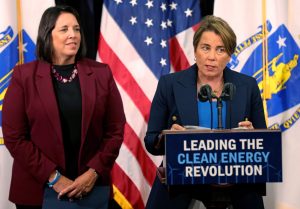
Massachusetts Higher Education Board uncertain of what Trump anti-DEI push means for colleges
Days after the Trump administration gave schools the choice to ditch diversity, equity and inclusion policies within the next two weeks or lose federal funding, the Higher Education Board chair weighed in on what Massachusetts colleges should do — telling education officials they don’t yet have answers as the clock ticks down.
“I wish we could say the Tuesday after a long weekend that we have all the answers — Obviously we don’t,” said Board Chair Chris Gabrieli at a virtual Higher Education Board Tuesday meeting.
“But our top priority is to be supportive to our campuses is they consider what actions could they, should they, must they take as they decide what’s both compliant in general terms of the law and what is in the best interest of the students and communities they serve,” he added.
In a “Dear Colleagues” letter, sent to education officials in all 50 states, U.S. Department of Education’s Acting Assistant Secretary for Civil Rights Craig Trainor instructed all elementary, secondary and post-secondary schools to scrub DEI policies from hiring, admissions, financial aid, scholarships, discipline, and “all other aspects of student, academic, and campus life.”
The Trump administration official said the policies are at odds with existing civil rights laws, citing precedent including Supreme Court anti-affirmative action ruling in Students for Fair Admissions v. Harvard and Title VI of the Civil Rights Act of 1964.
Massachusetts Attorney General Andrea Campbell also responded to the letter Tuesday.
“Diversity, equity, inclusion and accessibility policies remain legal, and any effort to convince institutions otherwise is fear-mongering,” Campbell stated. “The assertions in this letter go far past court precedent and case law, and the Department of Education cannot change the law with a memo.”
The AG said her office will “continue to monitor” the situation but did not suggest whether they plan to take any legal action.
Trainor gave schools until Feb. 28 to erase the policies or risk losing federal funding.
“The timeframe suggested under which one is supposed to react in two weeks was, I think, quite extraordinary by historical standards of reasonable time allowed to even consider whether one should do anything about it, much less what one would do,” said Gabrieli. “But it is what it is.”
Gabrieli said state education officials have met and are soliciting advise from “the most central authorities here in Massachusetts, within the executive branch and the Attorney General’s office” on messaging to deliver to schools.
Related Articles
Trump administration gives schools a deadline to end DEI programs or risk losing federal money
Schools around the US confront anxiety over Trump’s actions on immigration
Massachusetts Gov. Maura Healey pushes back on Trump administration order to end DEI in schools
‘Waste, fraud and abuse’ is a political fight older than the nation. Here’s what to know
Martinez: Students must make better choices on degrees
The Board chair did not say when schools may receive any state input and acknowledged his statement had “almost no direct meat” Tuesday.
“Like at the beginning of the pandemic, ultimately, each campus has got some direct responsibilities, but we can’t just say, “‘Good luck. Hope you can figure it out on your own,’” said Gabrieli. “We should try to do what we can to provide people guidance in what is a difficult and uncertain terrain. I think almost nothing can happen in the next two weeks that will make it certain as to what that terrain is.”
AG Andrea Campbell (Nancy Lane/Boston Herald)


